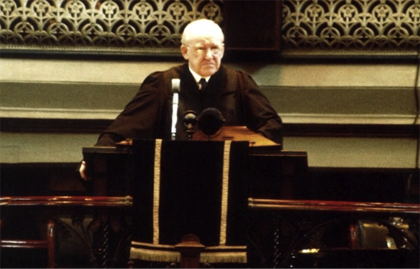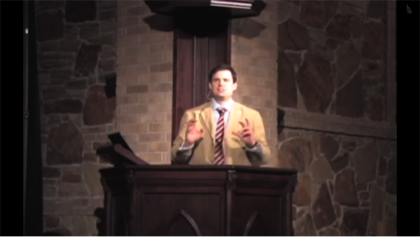A Global Vision of the Gospel: How do we respond? (V)
In our previous articles, we’ve discussed the challenges facing the global Evangelical Church. How do we respond? As with most things, a good place to start is with Jesus.
18 FEBRUARY 2015 · 10:00 CET

In our previous articles, we’ve discussed the challenges facing the global Evangelical Church. How do we respond? As with most things, a good place to start is with Jesus.
Jesus responsively communicated the truth
Jesus taught people the truth, rather than the truth to people. His message was not a canned speech to be read to each new crowd that gathered. Rather we see in Jesus a flexibility that articulated a distinct word of truth to each peculiar situation. When the scribes showed their lack of sincerity, Jesus responded by telling a parable that illustrated their hard hearts: “They knew he had spoken the parable against them” (Mark 12:12). 1
Jesus taught the truth to people where they lived. The truth did not change, but the particular point of application did depending on the context or person that Jesus was addressing. To communicate biblical truth relevantly, we need to understand the context we are addressing in order to communicate in a way that speaks into the unique situation.
Relevance, understood in this way, starts with people – but not necessarily with their felt needs. The ultimate goal of Jesus’ ministry was to glorify his Father in heaven. To glorify means in part to reflect. Jesus reflected his Father’s character and concerns into every situation he encountered. At times this meant he tenderly held the little children and gently healed a leper. In other words, Jesus occasionally met an individual’s felt needs. But Jesus also had a ministry of confrontation and regularly rebuked those he came into contact with, calling them “white washed sepulchers” (Matt. 23:27) or using a whip to clear the temple of the money changers (John 2:13-22).
We see the same principle of relevance at work with the apostle Paul. The church at Philippi was experiencing internal conflict and discord (4:2). When Paul writes the Philippians, he is seeking to reorient them as a church body. He gives them the foundational principles for how God’s people are to work together. Paul first thanks God for them and tells them how much he loves them (1:1-11) and focuses their attention on the gospel (1:12-26). He then teaches them how to work together by being united (1:27-30), humble (2:1-11), obedient (2:12-30), focused on truth (3:1-11), future oriented (3:12-4:1), and thankful (4:2-23).
In other words, Paul communicates relevantly by starting at the point where the Philippians were. In contrast, in response to the Galatians, Paul rebukes them for so “quickly deserting the one who called you” (Gal. 1:6). We see in the Apostle Paul’s letters to the various churches a profound understanding of each local situation and a relevant articulation of truth.2
Communication, if it is to be received, must take into account the situation of the hearer. Without this focus, communication is either easily dismissed or completely ignored.
How do we respond?
So how do we apply this principle to our ongoing discussion of a Global Vision of the Gospel? What is our current situation in global Evangelicalism? What challenges are we facing?
To summarize our previous articles:
- Evangelicalism has seen startling growth in the Developing World, but significant decline in Europe
- Europe has exercised enormous influence around the world over the past few centuries
- European unbelief has exploded and spread around the world and is the primary opponent to the Gospel
- Evangelicals have a passionate commitment to communicate the gospel and an entrepreneurial and results-oriented leadership approach
- Evangelicals have naively used cultural tools like marketing and management, which have shaped their communication and leadership methods
- Evangelicals are weak in confronting falsehood, cultivating deep discipleship, developing intellectually well-grounded leaders, and partnering with one another
Based on the model of how Jesus responsively communicated the truth, how should we respond to our situation?
From this perspective of relevance, there are several areas of the biblical worldview that need to be understood, lived and taught today:
- Persuasive Evangelism (Apologetics)
- Biblical Model of Discipleship
- Thinking Biblically
- Developing Spiritual Oak Trees
1) Persuasive Evangelism (Apologetics)
Today’s Western-educated elite are profoundly and fundamentally antagonistic to the gospel. Pluralistic, relativistic worldviews and virulent anti-Christian philosophies rule the influential cultural centers, both in Europe and America and increasingly in the Developing World. The same was true in the first centuries of church history. Few Christians commanded Roman legions, educated the Roman elite, or led Roman institutions.3
What should faithful believers do in such an antagonistic environment? We should imitate the Apostle Paul and the early Christian leaders.
Evangelicalism today is in great need of gifted apologists / persuasive evangelists who, like Paul, can demonstrate that Christianity is true and relevant. The words apologist and apologetics come from the Greek word apologia, which means “defense.” So when Peter writes, “Always be prepared to give a defense (apology) for the hope that is within you” (1 Peter 3:15), he is teaching that Christians must be willing and able to communicate the gospel persuasively to their neighbors.
A close reading of Acts reveals Paul’s extraordinary versatility as a communicator. Acts 17 records “as his custom was” Paul entered the Jewish synagogue and explained “why Jesus was the Christ.” Paul “proves,” “shows,” “demonstrates,” and “argues” why the Christian Gospel is the fulfillment of the Old Testament prophecies about the Messiah. He started where the Jews were and used their accepted authority of the Old Testament to persuasively present the truthfulness of the Gospel.

Later in Acts 17, Paul explains to the Greeks in Athens who their “Unknown God” really is. He quotes Greek poets, refers to Greek philosophical ideas and writers, and persuasively explains why the Gospel is true to the Greeks using their categories and cultural artifacts. Paul was a persuasive evangelist (which is what “apologist” means) and was at home in any venue because he took the time to understand the context and tailor his message accordingly. He could meaningfully convey Gospel truth to those of any worldview, and he was not afraid to engage in vigorous debate.
The early followers of Jesus did not place an appeal to faith in opposition to reason; they argued that Christianity was true. Paul communicated in the language and cultural concepts of his audiences why Jesus was the Christ (“the Word of Truth”) and why Christianity was true (“both true and reasonable”) and asked them to trust him.
Stefan Gustavsson -- Apologist
A modern-day example may help to illustrate this concept. Paul’s ability to persuasively communicate the Gospel inspired Stefan Gustavsson, the General Secretary of the Swedish Evangelical Alliance, to imitate Paul. Shortly after Stefan graduated from University, he was asked to lead the IFES university work for all of Sweden. He soon realized that many Christian students were unable to remain solid in their faith when confronted with the secular Swedish university setting.
As a strategic response, Stefan founded and now directs Credo Academy, a study center in Stockholm that teaches college students cultural analysis, worldview studies, apologetics, evangelism, and discipleship. Stefan and his co-workers help their students work through their own questions, including why the Christian worldview is actually true.
Stefan says the challenge for believers is to speak effectively to Europeans who have little to no understanding of the biblical story. In a setting like Sweden, people do not consider the Christian worldview plausible. Students participating in Credo Academy conduct a survey on university campuses asking their fellow students the following question: “If you had one chance to ask God a question, what would you ask?” The number one response is, “Are you there?” and is followed closely by, “If you are there, why not make yourself more obvious?” By understanding these questions and concerns, the Credo students are able to explain the Gospel in a way that makes sense to their peers.

[Listen to Stefan answer some questions about the biblical basis for apologetics, including “How did Paul’s convictions about the Gospel shape his apologetic approach?” and “How does the Bible portray Jesus as an apologist?” 6 ]
At the same time Stefan is training his students as persuasive evangelists, he is also debating leading non-Christians across Sweden. Stefan has debated the leader of the Swedish Humanist society many times. Both Christians and non-Christians are increasingly seeing the intellectual credibility of the biblical Gospel. Some Swedish humanists who have watched these debates have become believers.
In today’s secular, pluralistic, and skeptical European context, apologetics is vital for Christians to personally build confidence in the truth of the Gospel and to engage with non-Christians in order to persuasively communicate the Gospel. The Lord is using the public, confident and persuasive communication of the Gospel in Sweden, and in Europe more generally, and is raising up a movement of confident young persuasive evangelists.
2) Biblical Model of Discipleship
Ravi Zacharias travels to the leading universities in the world to answer tough questions from skeptics about the gospel. So when Ravi says he has a question he can’t answer, we should listen to him. Zacharias has insightfully written, “If there is one apologetic struggle I live with, it is this question: Why is it that so many people who talk of a supernatural transformation show so little of the transformed life?”7
I have also often closed the Bible perplexed. The depth of commitment, the sense of confidence, the aura of integrity that permeates its pages is often foreign to my experience with much of modern Christianity. I see this spiritual reality in the descriptions of the apostles Peter and John: “When they saw the courage of Peter and John and realized that they were unschooled, ordinary men, they were astonished and they took note that these men had been with Jesus” (Acts 4:13).
We as Evangelicals have defined the gospel as “accepting Jesus into our heart” (a phrase which is not in the New Testament), and we have allowed people to think that a person can be a Christian without being a disciple. I am convinced that Jesus did not give us this option. He confronted those who claimed to follow him but did not obey him: “Why do you call me Lord, Lord and do not do what I say” (Luke 6:46). Our Lord teaches that anyone who wants to follow him must count the cost. He tells us in the most simple terms that we must give all that we have to receive this priceless pearl (Matt. 13:45-6). Jesus clearly teaches that on the Day of Judgment he will say to many who think they know him “I do not know you” (Matt. 7:23).
The word “Christian” is used three times in the New Testament, while the term “disciple” for a follower of Jesus is used 270 times. Somewhere along the way of teaching the simple gospel, we have created a cheap grace where being Jesus’ disciple is optional.
As Evangelicals, we rightly believe that people only become Christians if they place their faith in Jesus. In biblical language we are convinced “by grace you have been saved through faith- and this is not from yourselves, it is the gift of God - not by works” (Eph. 2:8-9). We are justified by faith alone. But where does discipleship fit into this?
Jesus is very clear and teaches that anyone who is His disciple will be known by his love. We are called to trust and obey Jesus and grow toward spiritual maturity. Jesus emphasized the two greatest commandments: to love God with all our heart, soul, and mind and to love our neighbor as ourselves.
Jesus loved and led his disciples toward this spiritual and relational maturity. In turn, the apostles led new believers toward this same goal. This is the heart of discipleship and is also a picture of biblical leadership, to love God and to love others. Thus biblical discipleship and leadership are not reserved only for pastors; they apply to all Christians.
Terry Virgo – Church Planting Movement Leader
Terry Virgo has been used by the Lord to start New Frontiers, a modern renewal and church planting movement that has started over 250 churches in the UK and over 900 churches globally over the last 40 some years. This is extraordinary. But what I find more interesting and more important than the numbers of the New Frontiers churches is the distinctive model of discipleship and leadership that the Lord has given them.
In my interactions with New Frontiers leaders, I have asked them “What are the common characteristics of the New Frontiers movement, of this model of discipleship?” I have summarized their answers below.
People of prayer – For twenty some years, Terry asked all of the pastors and leaders of New Frontiers (up to 600+) to come together three times a year for three days of prayer. They would pray for two hours, take a break for an hour, then continue to pray, only pausing for meals and sleep. How many other leaders of Evangelical denominations or organizations pray like this?
What happens when you’re praying to God with others over days? You can't help but be transparent when you are on your knees before the Lord in prayer. If you are honest with the Lord, you become honest with each other and it is pretty hard to hide your sin and struggles. This leads to the next point.
Relationship People – When Terry was first converted he attended a church that did not allow those attending Sunday services to speak in the sanctuary. Terry soon realized that his unbelieving friends would never feel comfortable coming into such an austere environment. He started a Bible study in his home and this family relational environment became a central element of the New Frontiers DNA.
Over the last 16 years, I have met with many Evangelical leaders across all of Europe as part of my ministry. In my time with New Frontiers leaders, I have generally observed a unique set of characteristics. These leaders are genuine, authentic and honest with a relational connectivity that is not typical of most other pastors or Evangelical leaders I have interacted with. Terry is known not as Pastor Terry or Reverend Virgo or Mr. Virgo. He is simply Terry. There is a profound commitment to “love another,” “encourage another” and “serve another” at the heart of the New Frontiers movement.
A few years ago Terry invited Mark Driscoll to speak at the annual conference for New Frontiers leaders. At one point Driscoll taught that pastors should not get relationally close to the people that they are leading. The New Frontiers crowd listened politely but completely disagreed. They had experienced profound loving relationships similar to the Apostle Paul’s relationships with his closest co-workers. When the Ephesian elders realized that they would never see Paul again, Luke records, “There was much weeping on the part of all; they embraced Paul and kissed him” (Acts 20:37). Mark Driscoll’s model of business management with shallow ministry relationships collided with a much richer biblical model.
People of the Word – Who has been the most influential and theologically-grounded song writer in the last 20 years in the UK? Stuart Townsend. Where was Stuart trained theologically? Not at a Bible school or a seminary. Stuart was theologically trained in the pew at Terry’s church. Terry, an Evangelical by conviction, has taught a profoundly rich biblical theology to his church and his leaders. Terry and New Frontiers leaders generally have been deeply influenced by Evangelical writers such as J.I. Packer, Dr. Martyn Lloyd-Jones, John Stott, and Wayne Grudem.

[Terry recently wrote the article “Logic on Fire!” on how powerfully he was impacted by the preaching of Dr. Martyn Lloyd-Jones.]
This commitment to be rooted in the total truthfulness of God’s word permeates New Frontiers. The theology of New Frontiers has been shaped by the teaching of these robustly biblical writers, and more importantly, by the consistent and faithful teaching of God’s word.
People of the Spirit – Terry was convinced that the Holy Spirit could change ordinary people's lives and that God could use them in powerful ways. For example, a gardener who attended a New Frontiers church started a small group in his house. This small group became a house church, eventually growing to 200 people. At this point, the gardener-pastor approached Terry Virgo and humbly said: “Terry, this has grown into a real church, you need to find a real leader for it.” Terry responded: “It already has a real leader. You.” For years afterward, this gardener-turned-pastor was empowered by the Holy Spirit to lead his church, which eventually grew to 900 people.
Where else do we see this empowering and equipping of gifted lay leaders to grow into significant spiritual leaders? 9 At the very heart of this vision is an understanding that God wants to change people’s lives and use them in His work: “we all, who with unveiled faces contemplate the Lord's glory, are being transformed into his image with ever increasing glory” (2 Cor. 3:18).
3) Thinking Biblically
If the cause of the European church’s struggle was allowing the categories and priorities of the Enlightenment (world) to infiltrate Christians’ thinking, then the solution is to recover a biblical understanding in every area of life.
How do we do this?
The Church – At the heart of this renaissance of biblical thinking is the local church, the primary location for the teaching and equipping of God’s people. As John Stott explains, “God wants his church to grow up to maturity. The people of God grow through the Word of God. The Word of God comes to people mainly (not exclusively) through biblical preaching.”10 The danger today is that topical sermons have become increasingly popular in many Evangelical churches. When a church is fed primarily with topical sermons, the pastor’s personality and fundamental convictions disproportionately shape the church’s teaching. In contrast, teaching exegetically allows the Bible’s categories and content to shape the church’s thinking and practice.
Personal Reading, Study and Memorizing – For many Evangelicals, church has become an activity in their week that involves listening to a sermon and singing a few songs. Without dismissing the importance of the previous point of rich biblical preaching, the reality is that believers cannot live the Christian life by only listening to sermons. Without regular reading, study and meditation of God’s word, people do not think in the categories of scripture. Every believer needs such daily habits as reading God’s Word and praying to enable them to “not be conformed to the world, but be transformed by the renewal of your mind.” (Romans 12:1-2)
Thinking with a Christian Worldview – From a biblical worldview Christians can pursue knowledge and wisdom in any intellectual discipline or vocational field. Loving God with the entire mind means believers can be curious learners in every sphere and field. To think as a Christian about any topic, the biblical categories and concepts need to be the framework for our thinking. The Bible provides an amazingly rich and fertile framework to examine all of life. Without a clear biblical framework believers are naively thinking with world’s categories and priorities.
Biblical Theology in Response – Today there are many faithful pastors teaching the Bible on Sundays. There are also many faithful believers who practice the spiritual disciplines and exhibit the fruit of the spirit. There are even some believers who are explicitly thinking from a consistent Christian worldview and are teaching other believers how think Christianly about their calling and vocation.
We also need rich biblical teaching that is responding to the challenges, idolatries and questions of our day. For example, as I mentioned in a previous article, one of the greatest modern heresies is the health and wealth gospel and its twin, fulfillment theology, which teaches that Jesus makes you happy. Rick Warren has written The Purpose Driven Life, which challenges modern self-idolatry. The first line of the book, “Its not about you,” 11 is a slap in the face to modern narcissists. The book has sold tens of millions of copies because it is focused on where people are living and provides a biblical view of purpose. We need biblically rich teaching that addresses the popular worldview assumptions and idolatries of our age.
Defenders of the Bible – One of unbelief’s most profound attacks on Christianity over the last 200 years has come from skeptical biblical criticism operating from Enlightenment presuppositions. The church needs leaders who have the academic calling and training to answer the toughest questions and to explain why the Bible is God’s word.
Peter Williams – Faithful and Excellent Academic
Early in life, Peter Williams thought God might be calling him to be a Bible translator. But at Cambridge University as an undergraduate, Peter realized that the Bible was under attack. The aggressive unbelief he encountered caused some Christians to lose their faith. Peter saw the importance of explaining why the Bible is God’s word: “This is a huge need for many people. People aren’t able to answer questions and you really see this is a problem everywhere you go.”
Spurred by his passion to explain why the Bible is historically reliable and is God’s word, Dr. Williams went on to pursue his MA, MPhil and PhD in the study of ancient biblical languages from Cambridge University. After completing his PhD, he was appointed to the Faculty of the Divinity at Cambridge (1997-1998) as well as Research Fellow in Old Testament at Tyndale House, Cambridge (1998-2003). From 2003 to 2007 he served on the faculty at University of Aberdeen, Scotland, where he became a Senior Lecturer in New Testament and Deputy Head of the School of Divinity, History, and Philosophy. In 2007, Dr. Williams became youngest Warden (CEO) in the history of Tyndale House.
Peter’s work has taken several forms. Firstly, Peter has done excellent academic work in his areas of specialty. He has published various influential articles and a book in his field of biblical studies. Secondly, his leadership of the Tyndale House, one of the leading biblical research centers in the world, has been significant in developing Evangelical scholars globally for lives of faithful teaching and scholarship. Tyndale House serves as a rudder for the broader theological world as a more historic Christian position is becoming more influential in the academic world. Lastly Peter has served as a public spokesperson for the historic reliability of the Bible. For example, Peter’s lecture “New Evidences the Gospels were Based on Eyewitness Accounts,” received over 65,000 views on YouTube.

Peter often travels around Europe and the United States giving lectures and debating Bible critics to explain in the public arena why the Gospel is the “word of truth”.
4) Developing Spiritual Oak Trees
As noted in a previous article, John Wesley, during the Great Awakening, focused his attention in the typical Evangelical direction of evangelism, spiritual growth, and social concerns. In the process, he did not develop solid leaders (the spiritual “oak trees”) who could withstand the intellectual storms of the 19th century (Skeptical Biblical Criticism, Enlightenment Philosophy, and Darwinian Naturalism). These gales and tornadoes ripped up the Evangelical ivy, and England was left with a devastated church.
In short, the English Evangelical Church failed in these critical areas:
- Developing an adequate apologetic response to these new intellectual challenges.
- Loving God by mentoring the most academically gifted younger believers to develop their callings as faithful Christian researchers, teachers, and writers.
- Doing the difficult and time-consuming work of building the solid leaders (spiritual oak trees) to protect the Evangelical laity (spiritual ivy) from the storm of unbelief.

One of the greatest needs of today’s global Evangelical Church is for spiritually mature and intellectually strong leaders—spiritual oak trees. These leaders can provide shelter and protection for younger and more vulnerable believers.
I described the ministries and work of Stefan Gustavsson, Terry Virgo and Pete Williams because they are examples of the kind of leader -- spiritual oak trees -- that is so needed today. How did Stefan, Terry and Pete become an effective apologist, a church planting movement leader and a faithful and excellent academic respectively? All of them were once acorns into whom other leaders poured their time, energy and love to help them grow to maturity in their very different callings.
So how do we grow new spiritual oak trees?
We can start by recovering the biblical model of persuasively communicating the Gospel -- the topic of next week’s article.
----------------
1 Some text in this article is taken directly or developed from my book Willow Creek Seeker Services: Evaluating a New Way of Doing Church. Grand Rapids: Baker Books, 1996.
2 Evangelical theology is typically biblical and systematic theology. Biblical theology looks at the biblical text and tries to trace a theme throughout the Old and New Testaments or examines the theology of a certain biblical author. Evangelical Systematic theology takes biblical theology’s content and organizes it by topic. For example, justification: How does the whole of Scripture teach how we are to be saved? I am suggesting that Jesus’s model of responsively communicating the truth can complement biblical and systematic theology as it highlights areas of truth that we need to address.
3 Some of this material has been taken directly or developed from the some of the writing of European Apologetic Network (EAN) materials from more than 10 years ago. I am not sure if I wrote every word of this paragraph or if some portion was contributed by one of the other EAN leaders.
4 John S Y Lee. “Areopagus, Athens.” June 26, 2009. https://www.flickr.com/
5 This image is taken from Stefan Gustavsson’s video interview on FOCL Online. http://www.foclonline.org/answer/how-did-pauls-convictions-about-gospel-shape-his-apologetic-approach
6 For more resources from Stefan Gustavsson, please visit http://www.foclonline.org/users/stefan-gustavsson-0.
7 Ravi Zacharias International Ministries. “Lessons from War in a Battle of Ideas.” 2000. http://rzim.org/just-thinking/lessons-from-war-in-a-battle-of-ideas
8 This image is taken from Terry Virgo’s article, “Logic on Fire!” http://www.terryvirgo.org/Articles/428284/Terry_Virgo/Resources/Articles/Logic_on_Fire.aspx
9 This raises the question of whether the Evangelical church is creating enough opportunities for lay leaders -- like this gardener -- to grow up and lead through less formal theological training.
10 Langham Partnership International. “Vision and Mission.” http://us.langham.org/who-we-are/vision-mission/
11 Warren, Richard. The Purpose-Driven Life: What on Earth Am I Here for? Grand Rapids, Mich: Zondervan, 2002. https://www.youtube.com/watch?v=r5Ylt1pBMm8
12 This image is taken from Peter Williams’ lecture “New Evidences the Gospels were Based on Eyewitness Accounts” on Youtube, originally given as part of The Lanier Library Lecture Series on March 5, 2011.
13 Sue Bristo. “Strength and Endurance.” June 8, 2014. https://www.flickr.com/
Greg Pritchard earned his MA from Trinity School of Divinity before continuing on to finish his PhD at Northwestern University. The intersection of theology, history, philosophy and sociology is Greg’s primary focus both in teaching and writing. He has taught graduate-level courses on apologetics, theology, history, leadership, the New Testament, ethics, and Christian Thought at American, European, and Asian institutions of higher learning. His book, Willow Creek Seeker Services, has been published in four languages. In addition, Greg has worked as the COO at a Chicago investment firm. Currently, he serves as the President of the Forum of Christian Leaders and as the Director of the European Leadership Forum.
The Forum of Christian Leaders (FOCL) is the sponsor of the European Leadership Forum (ELF), which seeks to unite, mentor, and resource European evangelical leaders to renew the biblical church and re-evangelise Europe. This happens first at the ELF's annual meeting that occurs each May in Poland. In addition to the ELF, FOCL is host to an online media library and learning community for evangelical Christians. Learn more at foclonline.org and euroleadership.org; or join us on Twitter @FOCLonline and Facebook Forum of Christian Leaders.
Published in: Evangelical Focus - Forum of Christian Leaders - A Global Vision of the Gospel: How do we respond? (V)
